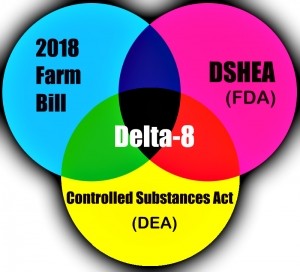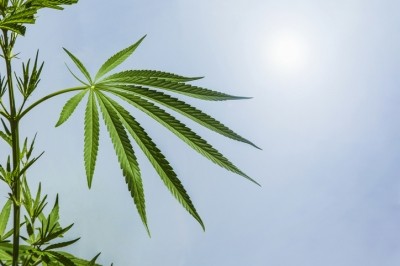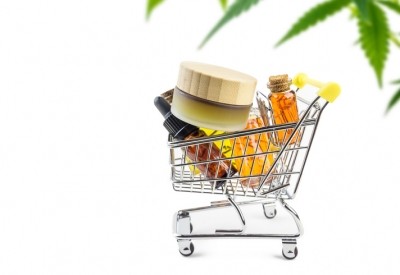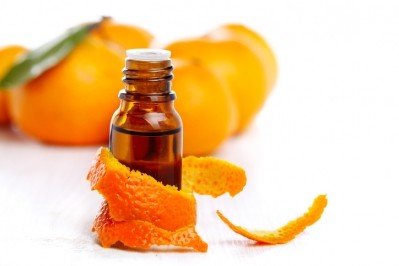The blurred lines of the legality of Delta-8
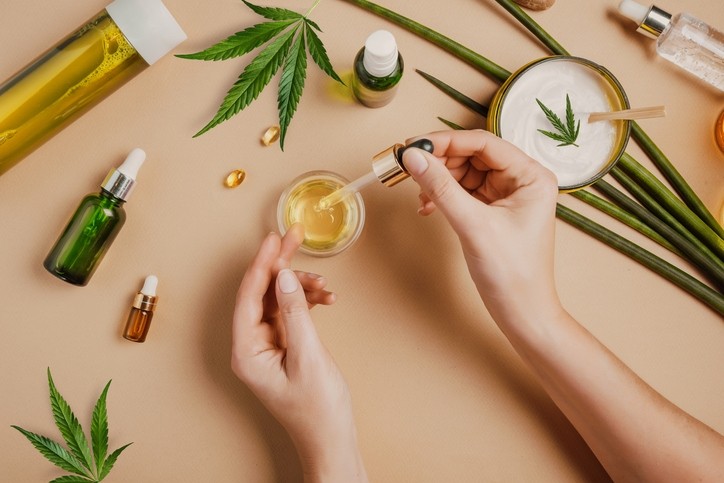
Despite having a similar chemical structure to the federally-banned Delta-9 THC, naturally occurring Delta-8 THC is not considered a controlled substance—and many see this compound as a loophole to bypass US laws.
“Delta-8 has exploded onto the scene in recent months, as manufacturers and brand owners have looked for ways to utilize and sell their amassed hemp biomass in a difficult market, due to federal regulatory uncertainty concerning CBD,” explained Marielle Weintraub, president of US Hemp Authority.
What is it
There are at least 113 cannabinoids found in the hemp plant, and Delta-8 is one of them. The compound is a less potent version of Delta-9, which is commonly known THC. While Delta-8 is weaker than Delta-9-THC, they are chemically similar and users can still get high if they take enough. Many have described Delta-8 as a happy medium between CBD and THC.
Jeff Gray, SC Labs co-founder and CEO, explained that Delta-8 can either be extracted from hemp on a smaller scale or manufactured from CBD, resulting in volumes of Delta-8 that we’ve never seen before.
“Delta 8 is actually a derivative of CBD. It is naturally occurring in some plants, but in very, very, very small amounts—and because of having so much CBD product on the market, producers were looking for something else we could do with it. So this is discovered, and some people say that it's a synthesis, but it's actually not synthesized, it's more derived," said Gray.
"So yes, they are changing the molecules, but they're not making something new by adding chemicals. It’s not a synthetic cannabinoid. It's just a derivative,” explained Kat Merryfield, founder of CBD brand Kat’s Naturals.
"Unlike CBD or Delta-9 THC, it naturally occurs at extremely low levels. Due to a similar atomic structure, delta-8 is an isomer of delta-9 THC, where the difference in structure can be seen at the location of the double bond in the carbon chain. Delta-8 THC found in the majority of products today is not extracted from the plant, but by transforming CBD (or delta-9 THC) into delta-8 THC through the addition of non-polar organic solvents and acids,” noted Weintraub.
“As I understand it, there's not sufficient quantities present to make it financially feasible to do it by extraction. But that would certainly substantially reduce risk level,” noted Rick Collins, an attorney that specializes in regulatory and legal issues related to dietary supplements and natural products.
Legal high? It depends on your perspective
Attorney Collins said that everyone’s interpretation of Delta-8 is going to depend on what they’re looking at—whether it be the 2018 Farm Bill, DSHEA, Controlled Substances Act or on a state-by-state basis.
We reached out to Collins after getting a variety of legal interpretations from the industry surrounding the status of Delta-8.
“I look at it like a Venn diagram. One of those circles is the 2018 Farm Bill, one of those circles is the FDA and the Dietary Supplement Health and Education Act, And the third is the Controlled Substances Act and DEA’s jurisdiction,” Collins explained.
“Delta-8 is actually fitting into an interesting loophole because federally, the law was written in the 2018 Farm Bill that only Delta-9 THC was still a schedule 1 drug. It also stated that hemp, its derivatives, and other salts, acids or molecules created from hemp were federally legal. So, because of the very, very specific way they wrote this bill, it leaves Delta-8 legal,” explained Merryfield. “Now, some states are cracking down on it because they see it as a challenge to the Delta-9 industry and they’re collecting a pretty decent tax revenue as well, and the people who are producing Delta-9 products in legal states don't particularly want to be undercut. So, some states are starting to build their own laws, but federally, I don't think there's anything they can do about it.”
“So if you look at the Farm Bill exclusively you might say, yeah, there's nothing wrong with selling Delta-8 as long as it's extracted from hemp,” said Collins, adding that the entire Venn diagram must be taken into account.
Gleb Oleinik, a CBD Journalist for Leafreport, told us that he also sees Delta-8 THC as smack dab in the middle of a legal gray area. “Technically speaking, as long as it’s derived from hemp, it’s not illegal. However, the legislators that wrote the 2018 Farm Bill which made hemp legal never foresaw the industry making intoxicating products from hemp. If they knew that it’s possible to make an intoxicating compound like delta-8 THC from hemp, they’d probably add a note to the law or make a separate law banning delta-8 THC,” he said.
“Congress did not intend to allow intoxicating products to be sold under the guise of hemp, so even where people argue that Delta-8 products comply with the letter of the law, they do not comply with the spirit of the law,” noted Weintraub.
When NutraIngredients-USA asked the FDA about the legal status of Delta-8, they referred questions to the DEA, which wouldn’t go into detail because the agency is currently in the midst of a rule-making process:
“As DEA is currently undergoing the rulemaking process regarding the implementation of the Agriculture Improvement Act of 2018—which includes the scope of regulatory controls over marijuana, tetrahydrocannabinols, and other marijuana-related constituents—we would be unable to comment on an any impact in legality of tetrahydrocannabinols, delta-8 included, until the process is complete. We are in the process of reviewing thousands of comments and do not speculate on what could happen as a result,” the agency told us.
Can Delta-8 producers learn from CBD?
“Absolutely,” said Oleinik. “The quality of CBD products and the extent of third-party testing has improved immensely over the past 5 or so years. These are two areas Delta-8 products struggle in. For example, most Delta-8 products are not tested for heavy metals, pesticides, and other potential contaminants, which is now the norm for CBD products. Some don’t even come with potency tests that show you the level of cannabinoids in the product. Another area Delta-8 producers can learn from CBD is removing delta-9 THC. Many CBD companies offer broad-spectrum products by removing THC from whole-plant hemp extracts. Since the process used to make delta-8 from CBD also produces significant amounts of delta-9 THC, it’s important to remove it from the final extract to keep the product safe and legal.”
If not done correctly, some worry this novel cannabinoid could destroy years of effort.
“I think the lessons that they need to learn from from watching the same boom and decline in the CBD Market is to stay conservative and produce products that don't have an excessive amount of Delta-8, label their products very clearly with warning labels so that people understand what they're selling even as the stores dealer does not inform them. And be careful because you know, we want all of these products to stay legal. We want access to these products for the people. But if we abuse our liberties, then, it jeopardizes our own our own industry and our own reputation that we've worked very, very hard to create and it's taken us, you know, the last seven years to create a legitimacy around CBD and we're going to have that same fight in the future for Delta 8 and Delta 9 eventually. But if we want to be taken seriously and we want industry to stay on the up-and-up with the lawmakers and the public we really need to be conservative," said Merryfield.
Safety concerns
Speaking on behalf of CBD watchdog Leafreport, Oleinik said at this time, they would recommend avoiding Delta-8 products. “They are of low quality and frequently contain much less (or in some cases much more) Delta-8 than they should. Many of them also contain too much delta-9 THC, which is not only illegal, but increases the risk of having a negative experience because Delta-9 THC is more potent than Delta-8.”
Indeed, a new Leafreport found that over 50% of Delta-8 THC products tested had illegal levels of Delta-9 THC. Out of the 38 products tested, 63% contained the wrong amount of Delta-8. More than 50% also had illegal (over 0.3%) levels of Delta-9 THC.
Beyond THC levels, industry is also ringing the alarm on the lack of oversight, which is resulting in heavy metals and intoxicants in some of the products.
“The CBD to Delta-8 conversion process can use nasty solvents such as toluene which have no place in an ingestible (or smokable) product. It can be common for poor process control in Delta-8 manufacturing to allow products with high levels of residual solvents to make their way into the supply chain,” cautioned Asa Waldstein, founder & principal of Supplement Advisory Group.
“Technically it's a naturally occurring phytocannabinoid, but in really, really small amounts in the plant. And what we're seeing isn't the extraction of those naturally-occurring phytocannabinoids, what we're being given isn’t the the concentrated form of what's naturally occurring in the plant, what we're getting is being manufactured from CBD through use of chemicals and solvents such that you're actually doing chemistry and manufacturing this product, which is the Delta-8 that we're getting,” noted Gray.
A path forward
Gray said that his hope is that discussions such as this motivate FDA and decision makers to come up with a comprehensive set of standards that don't leave things up to interpretation and ultimately jeopardize consumer safety.
Waldstein said he’s in favor of the restricted use of Delta-8, but it may fit better under state marijuana oversight. “This would cover the residual solvent and intoxicating warning concerns. It would also cover the need for childproof packaging which unfortunately is nearly nonexistent in the current Delta-8 market.”
“There is a path for delta-8 THC products, but selling them as a hemp product is not in the spirit of the Farm Bill. Due to its intoxicating effects it may be better to treat delta-8 THC products in the same manner as Delta-9 THC products, in order to assure that appropriate warnings and quality programs are followed to protect consumers,” said Weintraub.
